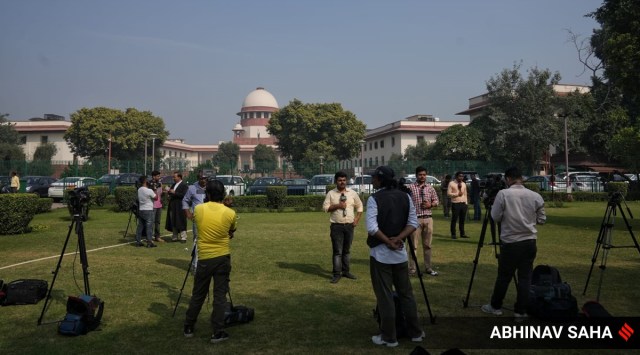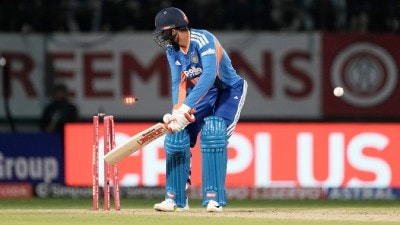At a time when three state governments have moved the Supreme Court against their Governors for keeping Bills pending, a three-Judge Bench led by Chief Justice of India D Y Chandrachud on Monday said Governors “must act” before the matter reaches the court.
Calling for some “soul-searching” by the Governors as well as Chief Ministers, the Bench said Governors “cannot be oblivious to the fact that they are not elected representatives of the people”.

“Why do parties have to come to the SC? The Governors must act before it comes to the SC… Only after they come to the SC, the Governors start acting. This has to stop,” the Bench, which included Justices J B Pardiwala and Manoj Misra, said.
While the Bench was hearing a plea filed by the Punjab government, which said that Governor Banwarilal Purohit had kept seven Bills pending, the Kerala and Tamil Nadu governments have also filed similar pleas.
Fixing the next hearing for November 10, the court asked Solicitor General Tushar Mehta, who appeared for Purohit, to apprise it of “the action taken by the Governor” by then.
Expressing doubts on the Punjab Assembly being adjourned sine die in March without being prorogued, the CJI said: “There is a little bit of soul searching required by the Chief Ministers, there is a little bit of soul searching required by the Governors. Because Governors also cannot be oblivious to the fact that they are not elected representatives of the people. The Governor can either withhold his assent, refer it to the President… they are duty bound… (or) they can return it once. And particularly on money Bills”.
“Honestly, my concern is this. Why should parties be required to move the Supreme Court for the convening of a Budget Session? We are a democracy which has been in operation since the birth of the Constitution. There are matters which have to be sorted out between Governors and Chief Ministers. We are available. We will ensure that the Constitution is complied with. But surely this is something which the Governor and the Chief Minister…,” he said.
Story continues below this ad
“The Assembly was adjourned sine die (after Budget Session) on March 22, 2023, without being prorogued. It was summoned on March 3, 2023. Now, the Speaker reconvened the sitting of the Assembly almost three months later, on June 12, 2023. Is that really the scheme of the Constitution… if there is going to be a break of three months, don’t you then… prorogue the session, and then reconvene the session. It is entirely the power of the government of the day to advise the Governor to reconvene the session, but… you have to hold a session within a period of six months, right? Six months is what the Constitution says… That’s why the life of an ordinance cannot exceed six months and six weeks,” he said.
“Now, what’s happening is he says you adjourn the session sine die for three months… Really speaking, the Budget Session merges with the Monsoon Session… Is this the scheme of the Constitution,” the CJI asked.
Appearing for the Punjab government, Senior Advocate A M Singhvi said, “This is a very strange case where a Governor has kept seven Bills… They are fiscal Bills, affiliated college Bills etc… The argument is strange, that it has been adjourned sine die. Therefore, I must start the session again. The session was admittedly only prorogued. After prorogation, the Speaker has the full power of recalling the session.”
“It’s never happened in constitutional history. And prorogation is a well-known term which allows the Speaker to reconvene,” Singhvi said. He submitted that Article 200 makes assent to a Bill mandatory and says the Governor shall not withhold assent.
Story continues below this ad
The SG agreed to apprise the court about the action taken by the Governor. “One thing I would agree with Singhvi is that there are certain astonishing things happening in constitutional history… keeping the Assembly alive without any proroguing or adjourning so that whenever you want to abuse people, you gather and abuse, claim privilege etc,” Mehta said.
“It’s astonishing. Never happened in the history of Indian democracy. Happening in two states. I will place before Your Lordships the position that this is unnecessary litigation,” he said.
Punjab Advocate General Gurminder Singh said of the seven Bills mentioned by Singhvi, four were passed by the Assembly in July and sent to the Governor. He said the Governor’s recommendation was sought on three of these Bills as they were money Bills. “In two, he has furnished his recommendation after the filing of the petition,” he said.
Meanwhile, Senior Advocate K K Venugopal told the court that the state of Kerala has filed a similar petition against the Governor for keeping “three Bills, all intended for the welfare of the people, pending for two years without disposing them”. The court said it would hear the matter whenever it comes up.
Story continues below this ad
The Tamil Nadu government has also approached the SC against Governor R N Ravi, complaining that 12 Bills were kept pending.









